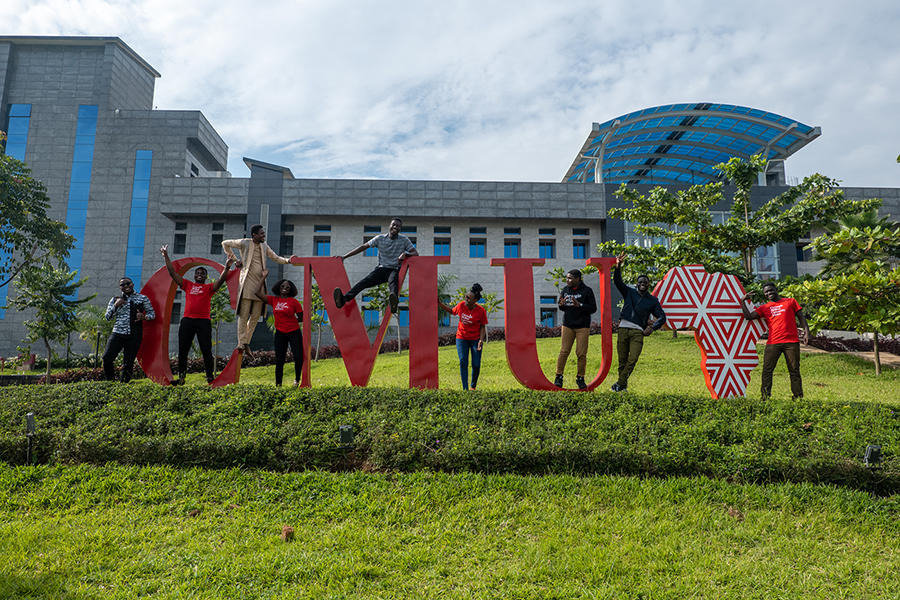
Transformational Growth at CMU-Africa
Carnegie Mellon University and the Mastercard Foundation, in collaboration with the Government of Rwanda, today announced a transformational investment in higher education and innovation in Africa.
The $275.7 million partnership with the Mastercard Foundation will significantly expand advanced engineering and technology education at CMU-Africa in Kigali. It will also catalyze opportunities for young people from economically disadvantaged communities and to drive inclusive development on the continent. This investment from the Foundation includes a $175M endowment to perpetually fund CMU-Africa. It also includes $100.7M to establish CMU-Africa’s Center for the Inclusive Digital Transformation of Africa.
“The key to creating opportunities for promising African students from all socioeconomic backgrounds is access to education in the high-tech fields that are driving the economies of the future,” says Farnam Jahanian, president of Carnegie Mellon University. “We are grateful to the Mastercard Foundation for their partnership with CMU over the past six years to help empower the next generation of Africa’s leaders, and we are delighted to be expanding our partnership even further. With this new collaboration, we will accelerate our shared mission and provide life-changing educational and career experiences for students across the continent.”
Specifically, through this historic partnership with the Mastercard Foundation, CMU-Africa will:
- Expand instructional capacity, including introducing a new degree in engineering artificial intelligence, and online learning programs.
- Grow the annual cohort of students enrolling in CMU-Africa by more than 33%.
- Provide additional financial assistance to more CMU-Africa students, including increased support for the Mastercard Foundation Scholars Program at CMU-Africa. The partnership will provide direct scholarship support to a total of 300 students.
- Ensure programs recruit and provide opportunities for marginalized groups, including women, people with disabilities, and displaced people.
- Pilot programs for English language immersion to help prepare undergraduate students from other African universities for graduate study.
The new partnership will also strengthen Africa’s research, entrepreneurship, and innovation ecosystem more broadly by:
- Establishing a network of higher education institutions in Africa that will work with the private sector and governments to create the conditions for inclusive digital transformation.
- Supporting up to 10 African universities to deliver high-quality engineering and technology education.
- Increasing digital knowledge creation to drive technology development and job-creating innovation through training, seed funding, and collaboration opportunities for researchers at CMU-Africa and other partner universities.
- Directly involving faculty and staff from CMU-Pittsburgh in CMU-Africa activities to innovate in education and help create the knowledge needed to drive the inclusive digital transformation of Africa in fields that include agriculture, health, and finance, among others.
Carnegie Mellon is the only U.S. research university with master’s degree programs and full-time faculty, staff, and operations on the continent. CMU-Africa was established in 2011 through a partnership between Carnegie Mellon University and the Government of Rwanda.
“The Mastercard Foundation’s support will enable us to accelerate our Africa strategy, which is uniquely defined to prepare higher education students to meet the complex needs of the digital future along with the research and entrepreneurship necessary to compete in the global economy,” says William Sanders, dean of the College of Engineering.
Africa has the youngest and fastest-growing population in the world. By 2030, there will be 375 million young people in the job market in Africa, and that number is expected to grow to more than a billion people within the next few decades. Young people in Africa represent the workforce of tomorrow and can serve as a force for Africa’s transformation if they have the skills and knowledge to participate in and build the economies of the future.
The new initiative builds on a previous partnership between the Mastercard Foundation and Carnegie Mellon University, as well as a successful 10-year partnership between the Government of Rwanda and CMU-Africa that has connected 561 young people from 21 African countries to world-class training—including 125 students supported through the Mastercard Foundation Scholars Program.
CMU-Africa offers graduate degrees in information technology, electrical and computer engineering, and engineering artificial intelligence through Carnegie Mellon’s top-ranked College of Engineering, with the same standards, curricula, and requirements as its Pittsburgh campus. As of spring 2022, the program enrolled over 230 students.
CMU-Africa has a strong connection to Carnegie Mellon University’s campus in Pittsburgh through engineering faculty collaborations, teaching and student exchanges. This connection will be deepened as a result of this new partnership with the Mastercard Foundation. Now, additional engineering research, policy research projects, and teaching innovations will strengthen both operations to drive inclusive digital transformation.
CMU-Africa’s impact includes an almost 90% graduate employment rate within the first year of graduation. Its alumni have founded or joined startup companies, are pursuing their Ph.D.’s in top doctoral programs in the U.S. and Europe, and are serving in government information offices, including within the Government of Rwanda and the World Bank.
“The Mastercard Foundation has been a critical partner in the growth of CMU-Africa as we help meet the growing demand for high-quality technical talent who will accelerate development on the continent,” says Allen Robinson, director of CMU-Africa and associate dean for international programs in Africa. “This new, extraordinary phase of our relationship will exponentially magnify our ability to build a pan-African network that positively impacts the future of young people across the continent.”